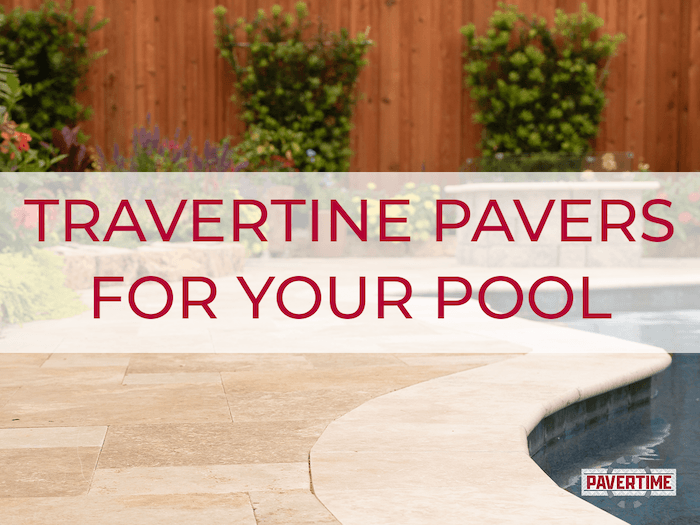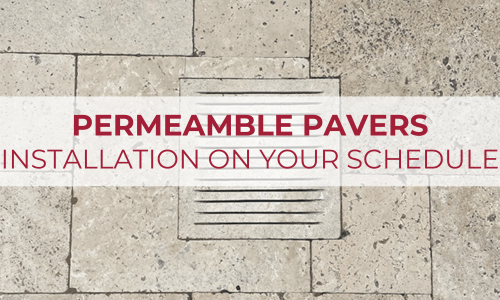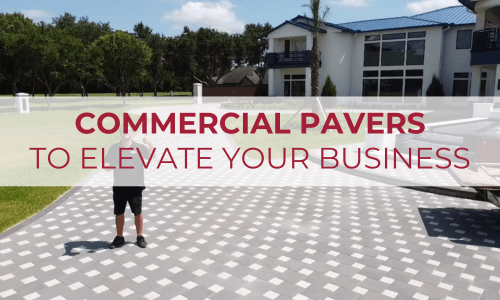If you plan to install a pool or upgrade the area around your existing pool, one essential factor to consider is the pool deck. Many homeowners use travertine pavers around pool areas because they absorb water. They stay cooler to the touch, which can protect your feet on hot summer days.
They also give your pool a stunning appearance with their natural beauty, which is why many technicians highly recommend them and homeowners in Houston truly appreciate them.
Are you ready to learn more about these pavers? Want to know why they are a top choice around pool areas? Keep reading to learn everything you need to know to make an informed decision about the pool pavers you select for your home.
What Is Travertine Stone?
Like limestone or granite, travertine is a natural stone. However, it only develops around particular kinds of mineral spring deposits, contributing to its unique and impressive appearance. It’s also available in warm to medium neutral tones. This makes it the perfect material to match any aesthetic.
Although it’s not as hard as other natural stone materials, it is quite durable. It does well in areas with heavy foot traffic, which is ideal for the pool area.
Why You Should Invest in Travertine Pavers Around the Pool
Aside from absorbing more water than concrete pavers, travertine decking has several attractive qualities.
1. Partially Heat-Resistant
Kids and adults typically walk around the pool while barefoot. You’ll often see kids hopping on concrete or brick pavers. They’ll rush to and from the cool water because their feet easily burn on the overheated walkway.
But, with travertine pavers, it won’t be as noticeable. In fact, this stone is almost 10 degrees cooler than concrete. It resists extreme temperatures better than other materials and makes a more comfortable walkway.
Travertine tiles pass cooler temperatures from the ground underneath up to the surface. This means that even on the hottest days, your pool deck will not burn your feet walking to the patio.
2. Low Maintenance
Travertine pavers are popular for pool decks due to their minimal maintenance requirements. However, low maintenance doesn’t mean no maintenance.
Covering each tile with a high-quality sealer will help keep your deck looking immaculate for many years. There are various options for sealers on the market, from sealers that penetrate the stone, leaving the surface close to its original state, to sealers that have a glossy finish. The sealer you choose can make a difference in the water absorption of the tile.
You should also have your pavers resealed approximately every two years to protect against damage and keep them looking sharp.
3. Durability
Travertine has a tough and wear-resistant surface. That makes it an excellent choice for poolside areas with heavy foot traffic. After a professional installation, these timeless pavers could last up to 30 years.
4. Eco-Friendly Materials
Travertine is a natural stone, which will help you support the environment at your home. A pool deck made out of travertine is a better choice compared to unnatural products that you might find in big box stores.
5. Natural Aesthetics
Travertine pavers also create an aesthetically pleasing appearance for your outdoor space. Although the stonework is in neutral tones, the colors and styles vary, giving you multiple options to create something that matches your style.
Are There Any Downsides to Travertine Pavers?
As you can tell, the advantages of travertine pavers make them an ideal choice for pool decks. However, there are a few things to keep in mind when you choose these stunning stones.
1. Porous Surfaces
Because travertine is porous, it contains various-sized holes. Although this unique feature helps absorb water, it can trap loose soil and other debris and lead to staining. Thanks to these holes, the pavers can also be challenging to clean. To keep them looking their best, consider applying a sealer.
2. Bumpy Textures
The holes in travertine pavers create a rough surface. Although manufacturers work to make it smooth, it’s almost impossible to eliminate every uneven spot. If you rub up against the bumpy texture getting out of the pool, it can feel rough on your skin.
3. Sensitivity to Chemicals
Chlorine is a commonly used pool chemical that has a low pH and acidic qualities. Because travertine can be sensitive to these kinds of chemicals, be careful with the liquids you carry around the pool, as spills could discolor your pavers over time. You should also read cleaning products’ labels to ensure they are made for stone products.
Curious About Installing Travertine Pavers?
If you’re wondering whether travertine pavers around pool areas are suitable for your home, contact Pavertime to schedule a consultation. We’ll help you explore options and guide you to the best paver to create your perfect outdoor space.Give us a call at 832-831-6058 to speak with one of our experts. Or, complete our contact form to give us some information about the goals for your Houston outdoor living space. We look forward to helping you out!





